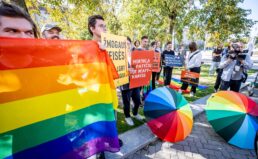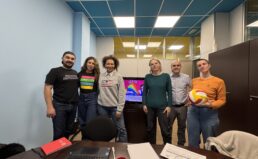In September, 2022 the Human Rights Monitoring Institute in Vilnius published a national report on Hate speech and Euroscepticism. The study was conducted among young people (16-25) over 10 years, from 2010 till 2020, with some events from 2021 included.
Here are some main findings concerning the LGBTI issues:
Indeed, the report shows a social distancing toward the LGBTI community with more the 50% respondents not wanting a homosexual neighbor in 2011. Even if the number drops to 48% in 2019, it is still very high. Research also show that verbal insults are the most common hate incident. Besides, the more visible one’s identity is, the higher the possibility of being a victim of verbal insult is. Thus, LGBTI people tend to live in a social bubble and distrust outsiders, they often try to be unrecognizable and invisible within the society in order to protect themselves. Most of the victims do not report the incidents to the police because of the fear of the reaction of the policemen who are often not sensitized to the issue.
The survey filled by Lithuanian young people indicates that LGBTI community is the group the most affected by hate speech. According to the participants, the phenomenon is quite common and happens every week or every day even. 48% of the respondents stated they experienced hate speech themselves, among them 65.5% said it was because of their gender and 26.3% said it was because of their sexual orientation.
The report also identified public figures spreading hateful, insulting and discriminative messages towards the LGBTI community, namely Petras Gražulis and Valdemaras Valkiūnas. There are also conservative organizations with traditional family views opposed to the LGBTI community such as Free Society Institute, Vilnius Forum or Pro Patria. Finally, some influencers spread hate speech against the community like the Blogger Zeppelinus or the journalist Audrius Bačiulis.
Moreover, the report explores the Euroscepticism in Lithuania, which is quite low. However, there is a kind of soft Euroscepticism that overlaps with homophobia. Indeed, the promotion of “traditional family” defined as a union of a man and a woman having children, is clearly in opposition to LGBTI families.
The work of the National LGBT rights organization LGL is also mentioned in the report as the organization is actively fighting against hate speech toward the LGBTI community. The report mentions LGL platform “UNI-FORM” that encourages LGBTI community to report if they experience hate crime or hate speech.




